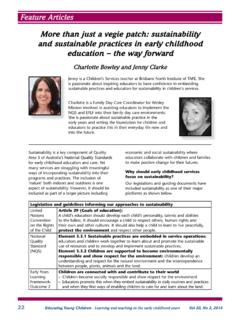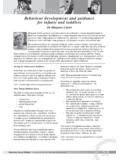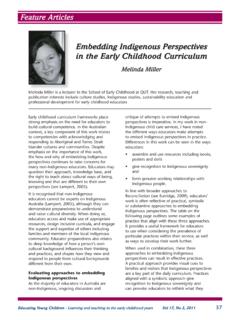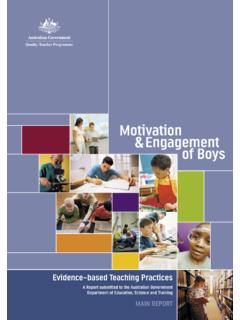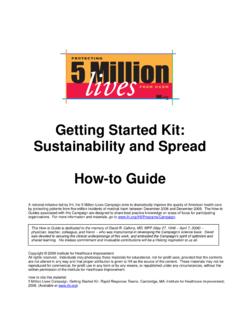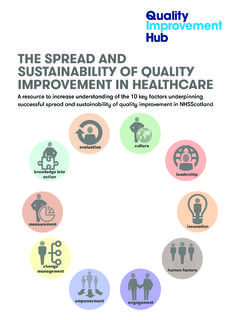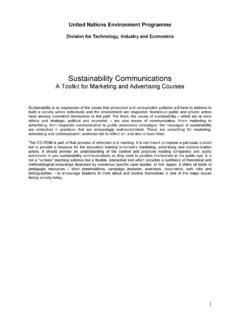Transcription of ECTA vol 15 no 2
1 Educating Young Children - Learning and teaching in the early childhood years Vol 15, No 2, 200930 While the current economic crisis affecting the world has taken some of the limelight from environmental and sustainability issues in the media, global warming and associated issues such as climate change remain critical evidenced by recent events in Australia such as the bushfires in Victoria and extreme rain events in Queensland. For several decades now there has been a gradually rising level of interest in addressing environmental issues through education. Early childhood educators are increasingly developing and implementing programs with an environmental focus.
2 Traditionally, these programs have focused on children s relationships and interactions with nature (education in the environment). More recently, projects such as recycling and water and energy conservation have become more apparent (education about the environment). A truly effective Education for sustainability (EfS) program must, however, address issues beyond this typical environmental realm. A holistic approach to EfS will engage children in experiences that empower them as active citizens and powerful agents of change (education for the environment). Such a holistic approach will give consideration not only to ecological sustainability but also to social, economic and political sustainability .
3 (Fien, 2004; UNESCO, 2006) This article will briefly discuss some of these possibilities and explore strategies for initiating and maintaining an EfS program (Sustaining sustainability ).Early Childhood Education for SustainabilityLife in the 21st century is presenting humanity with many challenges including economic recession, food shortages, poverty, global warming and ethnic and religious conflict. I believe, however, that children as young as 3 or 4 years (possibly even younger) already possess significant amounts of knowledge and understanding about such issues. Equipped with further knowledge, skills and support, children can develop the resilience and the capacity to deal with these challenges, rather than being frightened by such issues.
4 I believe that educators are doing children (and humanity) an injustice if they try to shelter young children or bubble wrap them to protect them from such challenges. The following provides a model and some examples of how such challenges may be addressed through early childhood education for sustainability (ECEfS).ECEfS encompasses three broad elements; all are interconnected and of equal importance (see Image 1):Education for sustainability in the early years:beyond recycling and veggie gardensRobert PrattRobert is an Early Childhood Educator. He has worked in a variety of Early Childhood settings in Australia and overseas for over 16 years. Throughout his life Robert has enjoyed a love and appreciation for the environment.
5 He feels fortunate that he has the opportunity to incorporate his passion for the environment with his work in Early Childhood Education. For the eleven years until 2008 he worked at Brisbane s Campus Kindergarten where he developed and coordinated many of the centre s sustainability initiatives. Robert works collaboratively with children, teachers and the community to embed sustainability ideals, concepts and actions into everyday life. In 2008 he received an Excellence by a Teacher Highly Commended award at the Australian Government National Awards for Quality Schooling. Robert is presently focusing his attentions on sharing his Education for sustainability experiences through conference presentations and education publications.
6 [This article is a snap shot from Chapter 4 - Practical possibilities and pedagogical approaches for early childhood education for sustainability by Robert Pratt in a forthcoming publication, Young Children and the Environment: Creating Sustainable Change through Early Education by Julie Davis (Ed.)]RsehECstliEducating Young Children - Learning and teaching in the early childhood years Vol 15, No 2, 200931 Educating Young Children - Learning and teaching in the early childhood years Vol 15, No 2, 200931 Image 1: A Model of Early Childhood Education for SustainabilityThis model illustrates the importance of the three central elements of ECEfS as they may be implemented in an early childhood setting.
7 These are the physical environment, the curriculum/program and the culture/philosophy of the service. 1. The physical environment - both built and natural. To ensure a service s sustainable operation and to promote modelling of sustainable practice, buildings should incorporate elements of sustainable design including water tanks, solar energy, and grey water treatment. Outdoor playspaces should aim to be as natural as possible providing opportunities for children to immerse themselves in the richness of The curriculum/program - EfS curriculum content must be fully integrated into the program. Practices promoting sustainable living need to become an everyday part of our lives.
8 Children must have opportunities to connect with nature, learn about our environment, our impact upon it and develop the skills to act to improve our environment. Daily practices could include maintaining an organic fruit and vegetable garden, recycling, re-using and reducing waste, composting and worm farming. 3. Philosophy/Culture - Early Childhood services must aim to promote a culture of sustainability whereby all members of the community (children, teachers and families) become ecologically-, socially-, economically- and politically-aware citizens. (Fein, 2005) A philosophy or culture that recognises and values the inputs of all community members - and one that recognises children as citizens of the present and embraces active citizenship - is critical.
9 Core values must include equity in all respects: between generations, between humans as individuals or communities, and between the human and non-human species that inhabit this planet. The questions below may be used by early childhood educators when considering their own teaching philosophy and approach to following documentation shares an example of children participating as active citizens in an environment that values their input and ideas and empowers them as agents of change. It also highlights the fact that children already have some knowledge and understanding of issues such as global warming and are capable of contributing not only in a dialogue on the subject but also in offering real solutions:Do you believe?
10 -Everyone and everything on earth should be treated with respect?Women and men are equal?Every child should have access to education?Everyone should have access to health care?Everyone should have access to clean water and clean air?We should all live in a world free of persecution and conflict regardless of religion, culture, or ethnicity?We should consider the needs of future generations?These are all elements of SustainabilityEducating Young Children - Learning and teaching in the early childhood years Vol 15, No 2, 200932 Using the newspaper article (right, from the Courier Mail, 2008) as a provocation, Robert (teacher) introduced the topic of global warming to the Kindy friends.
